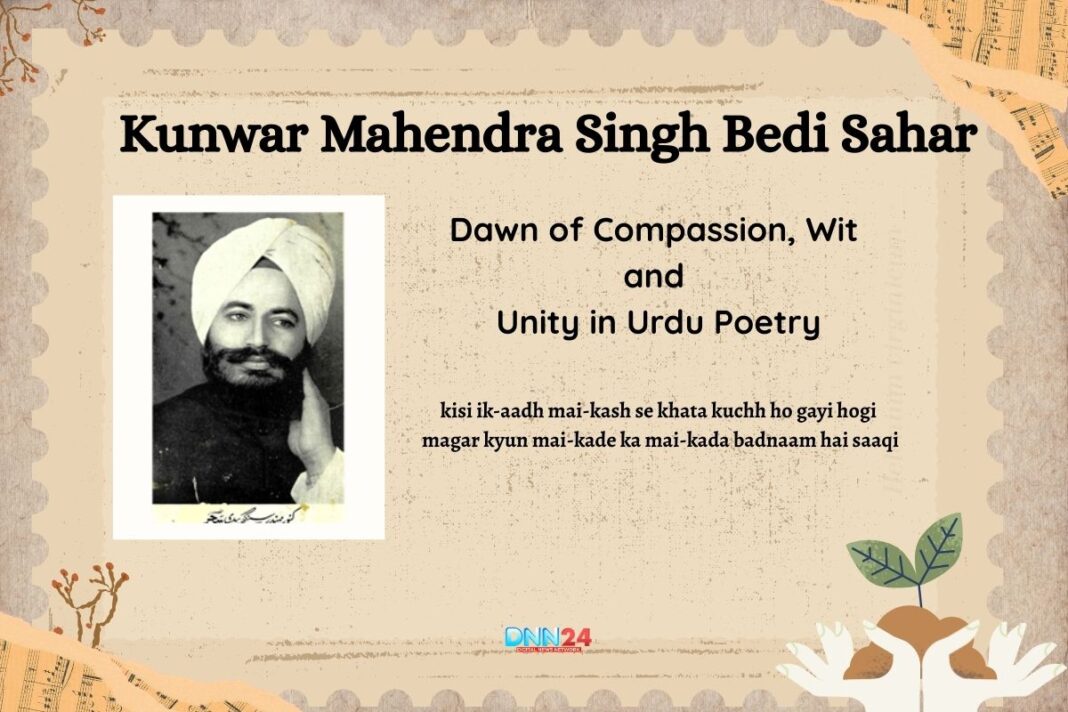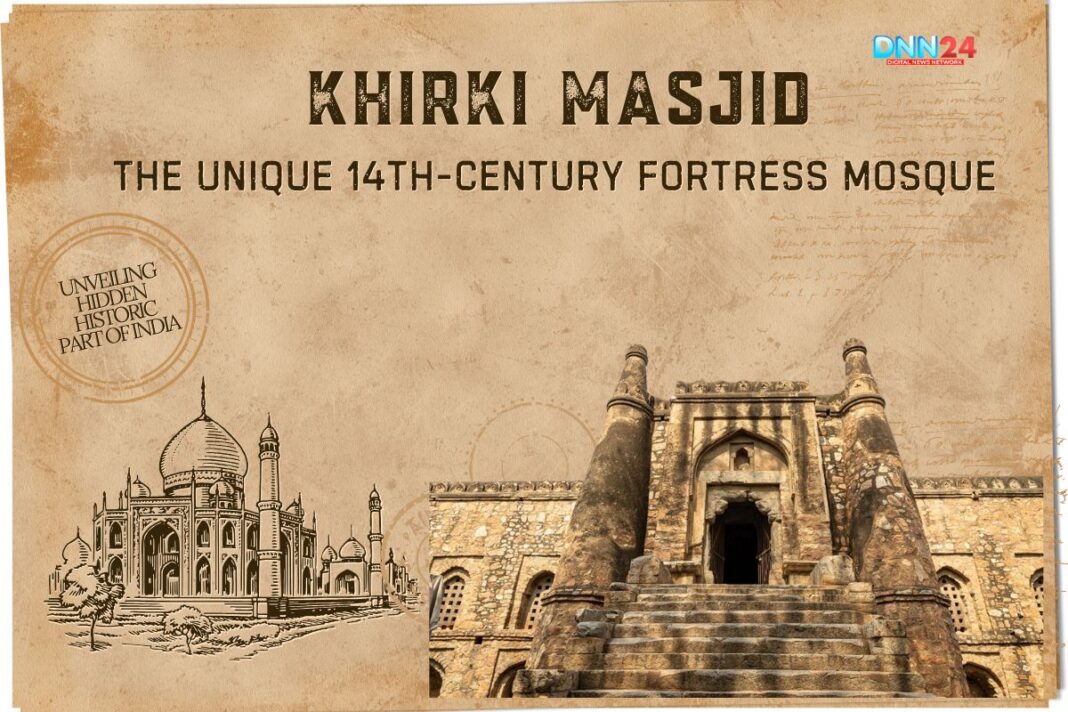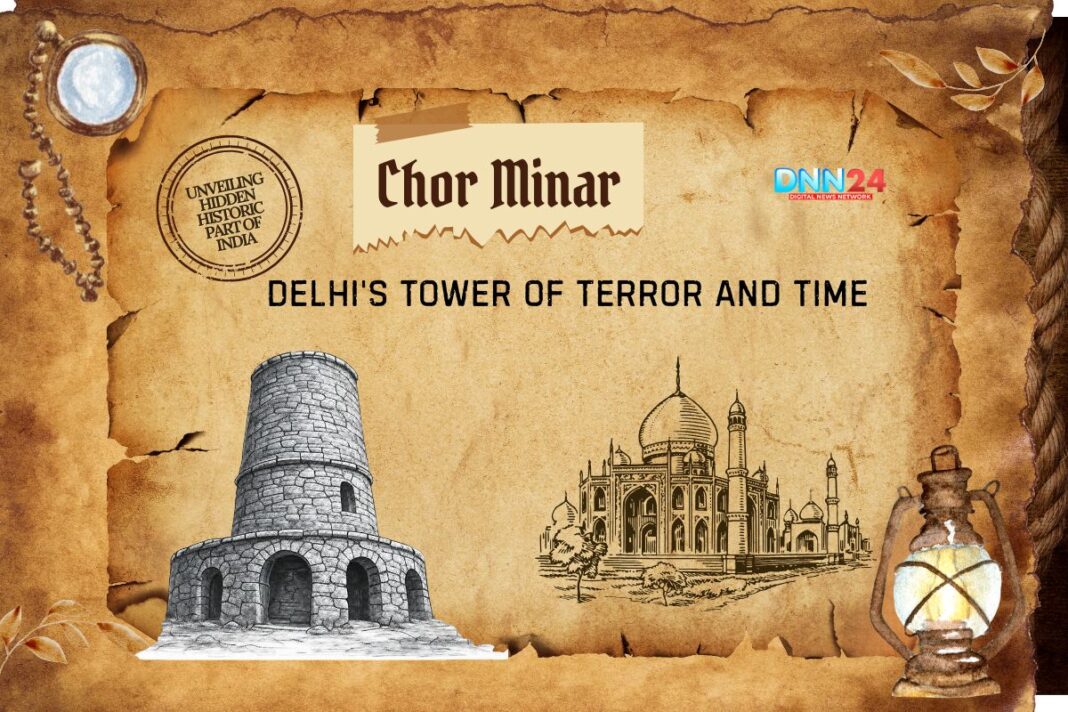The skies of Urdu poetry are graced by some voices that boom like thunder, loud and fierce and memorable. But Kunwar Mahendra Singh Bedi Sahar, known simply as Sahar, emerged like the gentle glow of dawn His verses did not scream; they healed. His words did not divide; they stitched together broken hearts. Born on 9 March 1909 in the lush, fertile land of Chak Bedi, Montgomery District, Punjab—today part of Pakistan—Sahar grew up in a land alive with folk tales, Sufi songs, and the warmth of shared living. His nickname, Sahar, meaning daybreak, was more than a name. Destiny hinted that one day his poetry would become a ray of hope in times of despair.
ham un ke sitam ko bhi karam jaan rahe hain
Kunwar Mahendra Singh Bedi Sahar
aur vo hain ki is par bhi bura maan rahe hain
But history had other plans. The Partition of 1947 tore Punjab apart, uprooting families, friendships, and centuries of shared culture. Sahar’s own family was forced to leave their ancestral land and rebuild life in Fazilka, India. This wound of displacement left a permanent mark on him. Unlike privileged poets who only imagined suffering, Sahar lived it. He carried that loss into his verses, which is why millions of displaced and broken people found their reflection in his poetry.
muskuraana kabhi na raas aaya
Kunwar Mahendra Singh Bedi Sahar
har hansi ek vardaad bani
For him, poetry was not an ornament of language—it was a mirror of human emotions. And in that mirror, Sahar made sure every reader, whether Hindu, Muslim, Sikh, or Christian, could see themselves.
Forged by Pain, Softened by Compassion
The years after Partition were not easy for Sahar. Imagine a land where every second household carried stories of migration, where families longed for homes they would never return to, where villages were scarred with silence. Sahar grew up in this atmosphere, but instead of letting bitterness consume him, he chose compassion. He understood what it meant to lose everything—land, identity, neighbours, roots. And so, he turned his sorrow into empathy, his pain into poetry.
marna to laazim hai ik din ji bhar ke ab ji to loon
Kunwar Mahendra Singh Bedi Sahar
marne se pehle mar jaana mere bas ki baat nahin
Sahar’s house in exile did not become a place of mourning. Instead, it remained filled with laughter, the rhythm of Punjabi folk traditions, and the melody of Urdu couplets. His verses constantly echoed one message—that pain is universal, and humanity is shared. When others wrote with anger, Sahar wrote with kindness. When others saw divisions, he saw bridges. His poetry reminded people that even though history may separate communities, the heart beats in the same rhythm everywhere.
shokhi shabaab husn tabassum haya ke saath
Kunwar Mahendra Singh Bedi Sahar
dil le liya hai aap ne kis kis ada ke saath
This was what made Sahar stand apart. He was not only a poet for literary circles but also a poet of the people. A refugee could hear him and feel understood. A farmer could recite his lines and feel strength. He was proof that poetry was not only for books but also for healing broken spirits.
Humour, Wit, and Mushairas
If you think Sahar was only about tears and sorrow, you would be mistaken. He had another gift—an incredible sense of humour. His wit was sharp but never cruel, playful yet thought-provoking. At mushairas, the poetic symposiums where poets from across the land gathered, Sahar was a star performer. His repartee with fellow poets often had audiences laughing one moment and clapping in admiration the next.
utha suraahi ye sheesha vo jaam le saaqi
Kunwar Mahendra Singh Bedi Sahar
phir is ke baad khuda ka bhi naam le saaqi
He often used satire to highlight social hypocrisy. Religious leaders and politicians who preached one thing but practised another often found themselves exposed in his verses. But unlike harsh critics, Sahar’s humour did not sting—it healed. His jokes carried wisdom, his laughter carried lessons. He reminded people that even in darkness, there was room for laughter, and even in laughter, there could be truth.
phir is ke baad hamen tishnagi rahe na rahe
Kunwar Mahendra Singh Bedi Sahar
kuchh aur der muravvat se kaam le saaqi
His Jashn-e-Sahar gatherings became cultural festivals where boundaries dissolved. From India to the UAE, his poetry sessions became celebrations of harmony. People from all walks of life gathered not just to hear his couplets but to feel part of something larger—a community of hearts united through words. Sahar’s humour was never about mocking others; it was about reminding people of their shared humanity.
A Voice for Unity Across Borders
Perhaps Sahar’s most enduring quality was his voice for unity. At a time when Partition had left deep wounds and hatred between communities, Sahar rose above politics. He used his poetry to remind people of what they had forgotten—that saints, prophets, and teachers belonged to all of humanity, not to a single religion. His famous couplet still rings true today:
“Mardaan-e-paakbaaz the aabid the nek the
Kunwar Mahendra Singh Bedi Sahar
Nanak, Masih, Krishna, Muhammad sab ek the”
These lines were more than poetry; they were a philosophy. Sahar believed that poetry was not a wall to divide people but a bridge to connect them. In an age when hatred was rising, his verses became medicine. He wanted his audience to know that love and faith were not about ownership but about sharing. That is why his poetry continues to resonate, even decades after his passing.
The Struggles Behind the Fame
Behind the applause of mushairas and the glow of fame, Sahar’s personal life was filled with struggle. Like many poets of his time, he did not enjoy wealth or financial stability. Manuscripts had to be pawned, publishers delayed payments, and survival was often uncertain. His autobiography, “Yadon Ka Jashn” (A Celebration of Memories), reveals the candid truth of these struggles.
ishq o mohabbat kya hote hain kya samjhaoon vaaiz ko
Kunwar Mahendra Singh Bedi Sahar
bhains ke aage been bajana mere bas ki baat nahin
But Sahar never allowed hardship to kill his spirit. Whether performing in a small village for farmers or in a grand hall for international audiences, he gave the same energy and warmth. His humility became legendary. He treated everyone—fellow poets, critics, admirers, or ordinary listeners—with the same kindness. In fact, when people came to him in despair, he often wrote verses of hope, especially for them. He was not only a poet who wrote about compassion; he lived it.
Balancing Two Lives: Administrator and Poet
What makes Sahar even more fascinating is how he balanced two very different worlds. By profession, he served as an officer in the Indian administration, even holding positions like District Commissioner. By passion, he was a poet. While most would find such a life conflicting, Sahar saw no contradiction. For him, both administration and poetry were forms of service.
zindagi maut ban gayi hoti jaan se hum guzar gaye hote
Kunwar Mahendra Singh Bedi Sahar
itne ishrat-zada hain hum ki agar gham na hota to mar gaye hote
During the day, he worked with refugees, farmers, and ordinary citizens. At night, he poured those experiences into verses. His official duties gave his poetry authenticity, and his poetry gave his official duties empathy. It was a rare combination—discipline meeting sensitivity, governance meeting art. For Sahar, life was not about choosing between poetry and service; it was about weaving both into one journey of compassion.
Works, Legacy, and Eternal Relevance
Sahar’s works remain milestones in Urdu literature. His celebrated collection “Tulu-e-Sahar” (The Dawn of Sahar) displayed his mastery of lyrical beauty and his depth of thought. His autobiography “Yadon Ka Jashn” remains a vital cultural document, not just of his own life but of the Partition-era Punjab. He also played a crucial role as an organiser of mushairas, ensuring that Urdu’s oral traditions remained alive.
When Sahar passed away on 18 July 1998, India mourned the loss of a poet who was also a healer. Yet his legacy lives on, not just in his verses but also through the Kunwar Mahendra Singh Bedi Award, instituted by the Haryana Urdu Akademi. This award honours poets who continue to enrich Urdu literature, keeping their memory alive.
Even today, in a world scarred by intolerance, Sahar’s poetry feels urgent. His couplet—
“Ishq ho jaaye kisi se koi chaara to nahi
Kunwar Mahendra Singh Bedi Sahar
Sirf Muslim ka Muhammad par ijara to nahi”
remains a gentle reminder that love cannot be caged, and humanity cannot be divided.
Conclusion: The Gentle Dawn
Kunwar Mahendra Singh Bedi Sahar was not just a poet. He was a bridge-builder, a healer, and a gentle dawn that rose after one of history’s darkest nights. His life was a lesson in resilience, his poetry a call for unity, and his personality a beacon of humility. He turned the pain of displacement into verses of compassion, the bitterness of Partition into songs of togetherness, and the wounds of history into lessons of humanity.
Even today, Sahar shines like dawn—soft yet unstoppable, humble yet eternal. Beyond borders, beyond faiths, beyond politics, his words remind us of one timeless truth: humanity is one.
Also Read: Majaz: The Poet Who Made Aligarh University Sing
You can connect with DNN24 on Facebook, Twitter, and Instagram and subscribe to our YouTube channel.



